**Note: This page is for educational inspiration and is not officially affiliated with World Wildlife Day. For official information, themes, and resources, please visit the United Nations World Wildlife Day website: www.wildlifeday.org.
Tuesday 3rd March 2026
Understanding World Wildlife Day in EYFS & KS1
Let's explore the amazing animals and plants that share our planet! 🌍🌿 World Wildlife Day is an annual global event, celebrated on March 3rd. It was proclaimed by the United Nations General Assembly to celebrate the incredible diversity of wild animals and plants across our world. The day aims to raise crucial awareness about the beauty and variety of wild fauna and flora, and to recognise the vital role of wildlife conservation in achieving sustainable development. It also serves as a critical reminder of the urgent need to intensify efforts against wildlife crime and the human-induced reduction of species, issues that have far-reaching economic, environmental, and social consequences.
For early years settings, nurseries, preschools, childminders, and Year 1 and Year 2 classrooms, this day provides an expansive and fundamental theme for exploring biodiversity, habitats, conservation, understanding the world, and environmental stewardship. It's about introducing children to the vast array of life on Earth, understanding how different living things depend on each other and their environments, and fostering an early sense of responsibility for protecting nature. This day offers wonderful planning ideas and inspiration for engaging activities that truly resonate with young minds, making learning about ecology and global environmental issues both captivating and essential.
Why Is Teaching About Wildlife Important for Young Children?
Integrating lessons about wildlife into your practice with young children (aged 0-7) is incredibly important for fostering environmental literacy, developing an appreciation for nature, and building a foundation for responsible global citizenship.
Biodiversity Appreciation: Introduces children to the vast variety of living things on Earth, fostering wonder and respect for all life forms.
Understanding Ecosystems: Helps children grasp how different plants and animals interact with each other and their environment.
Environmental Stewardship: Cultivates an early sense of responsibility for protecting nature and its inhabitants.
Observation Skills: Encourages children to observe, identify, and learn about local and global wildlife.
Empathy for Living Things: Promotes compassion and a desire to care for animals and plants.
Science & Geography Connections: Lays groundwork for understanding biology, ecology, and global environments.
Engaging Wildlife Activities for World Wildlife Day (0-7 Year Olds)
Embark on a journey into the wild for World Wildlife Day with these planning ideas and activities perfect for EYFS and KS1 children. The focus is on discovering different animals and plants, understanding their importance, and thinking about how we can help! Many of these early years and year 1 activities can be supported by our extensive range of 'Wildlife' and animal-themed resources.
Here's some inspiration for celebrating the world's incredible wildlife in your setting: (Please use your own discretion and knowledge of your children to ensure appropriateness of each activity and safety concerning any materials given and activity undertaken.)
Explore Diverse Animals & Habitats: Introduce children to different types of wildlife and the places they live. Use our dedicated pages and resources for:
Animals: Our main 'Animals' page is a great starting point.
Habitats: Explore different environments like 'Wetlands', 'Woodland (Temperate)', 'Ocean', and 'Polar' regions using their specific resource pages.
Specific Animal Groups: Delve into 'Mammals', 'Reptiles', 'Fish', and 'Invertebrates' using resources from these pages.
Minibeast Safari: Go on a minibeast hunt in your outdoor area. Use 'Science - Activity Pack - Minibeast Hunt' and 'Minibeast Search Checklist'. Discuss why minibeasts are important for the environment.
Birdwatching: Conduct a garden birdwatch to identify local wildlife. Use 'Garden Birdwatch Mat' and 'UK Birds Number Slice Puzzles (1-5 & 1-10)'. Learn about bird body parts with 'Pigeon Body Parts - Poster & Writing Sheets'.
Life Cycles: Discuss the life cycles of different animals or plants (e.g., butterflies, frogs, sunflowers). Use 'Endless Life Cycle Puzzles'.
Caring for Local Wildlife:
Talk about how to help wildlife, especially in different seasons. Use 'Helping Wildlife In Winter' Poster' and 'Feed The Robin Pencil Control Mats'.
Consider creating a "wildlife friendly" spot in your garden or playground.
Creative Wildlife Activities:
Colouring: Provide 'Animals Of The World Mega Colouring Pack', 'Zoo Animal Colouring - With Name & Footprint', and other animal-themed colouring sheets.
Mark Making/Drawing: Provide opportunities for children to draw their favourite wild animals or plants.
Fine Motor Skills: Engage with 'Fine Motor Butterflies'.
Design Activities: Use 'Beach - Design A Shell Multimats’ or 'Beach - Mark Making Cards'.
Numeracy & Literacy with Wildlife:
Counting: Use 'UK Birds Number Slice Puzzles (1-5 & 1-10)', 'Hedgehog Numbers 0-20', and 'Zoo Animal Counting Display Posters/Flashcards'.
Subitising: Practice quick recognition of quantities with 'Autumn - Hedgehog Subitising (1-3)'.
Alphabet: Use 'Zoo Animal Alphabet Display Cards'.
Outdoor Exploration & Mindfulness: Encourage mindful observation of nature. Use 'Beach - Mindfulness Scavenger Hunt Sheets' or resources from our 'Forest School' and 'Out and About' pages.
STEM Challenges: Integrate wildlife themes into STEM activities. Use 'STEM - Challenge Cards' and 'STEM - Winter Challenge Cards'.
Environmental Awareness (Age-Appropriate): Introduce simple concepts of why wildlife needs protecting, perhaps linking to recycling (see our 'Recycling' page) or gardening ('Gardening - Sunflower Growth Ordering Cards', 'Gardening - 'Green Fingers' Certificate').
Explore More: Please visit the following pages to browse our entire collection of ‘Wildlife’ educational materials, covering a vast array of topics from specific animals to habitats and environmental themes: 'Animals', 'Autumn', 'Beach School', 'Birds', 'Endangered Animals', 'Fish', 'Forest School', 'Gardening', 'Habitats', 'Invertebrates', 'Life Cycles', 'Mammals', 'Minibeasts', 'Ocean', 'Out and About', 'Plants', 'Polar', 'Recycling', 'Reptiles', 'Spring', 'The Environment', 'Under the Sea', 'Wetlands', 'Winter' and 'Woodland (Temperate)'.
These activities offer great inspiration for making World Wildlife Day a memorable and impactful experience in your early years and Key Stage One setting, fostering environmental awareness, biodiversity appreciation, scientific curiosity, and a genuine love for the natural world.
To explore ideas surrounding additional early years events, please visit our 'Special Dates Calendar' page.
Printable resources to support teaching & learning surrounding: ‘World Wildlife Day’
Free Wildlife activities for EYFS & KS1:
Wildlife activities for EYFS & KS1:
Please visit the following pages to browse our entire collection of ‘Wildlife’ educational materials.
More Early Years Event Pages for MArch
Let's meet William Shakespeare and explore his amazing stories and words! 🎭👑 Shakespeare Week is a special yearly celebration organised by the Shakespeare Birthplace Trust. It's made to…
Let's learn all about our amazing water and why it's so important! 💧🌍 World Water Day is a special day celebrated every year on March 22nd. It was chosen by the United Nations (UN) way…
Let's play with words and make beautiful poems! 📝✨ World Poetry Day is celebrated every year on March 21st. It was chosen by UNESCO (a part of the United Nations) in 1999. The main…
Let's look around and celebrate all the wonderful colours in our world! 🌈🎨 International Colour Day is celebrated every year on March 21st. This special date was chosen by a group…
Let's look closely at the little birds around us and learn how we can help them! 🐦🏡 World Sparrow Day (WSD) is a special international day celebrated every year on March 20th. It's all…
Let's make sure our smiles are super strong and healthy! 😁🦷 World Oral Health Day (WOHD) is celebrated all over the world every year on March 20th. It's a special international day that…
Let's celebrate all the amazing and unique ways our brains work! 🧠✨ Neurodiversity Celebration Week is a worldwide initiative that challenges old ideas and misunderstandings about…
Let's learn all about super food and wonderful water to help our bodies grow big and strong! 🍎💧 Nutrition and Hydration Week is an annual event in the UK that highlights and promotes the vital…
Let's snuggle up and learn all about sleep! 😴✨ World Sleep Day (WSD) is an annual event organised by the World Sleep Society and observed on the Friday before the Spring Equinox…
Let's learn about our amazing kidneys and how to keep them healthy!💧🧡 World Kidney Day (WKD) is a global health awareness campaign celebrated annually on the second Thursday of…
Let's discover the amazing science that helps us stay healthy! 🧑🔬🩺 Healthcare Science Week is an annual, UK-wide celebration that promotes and raises awareness of the incredible work done…
Let's celebrate all the amazing women in our lives and around the world! 💖💪 International Women’s Day (IWD) is a global holiday celebrated annually on March 8th. It's a very important…
Let's be curious scientists and explore the world around us! 🧪🔬 British Science Week is a fantastic ten-day celebration of science, engineering, technology, and maths (STEM). It features…
Let's dive into the wonderful world of books! 📚✨ World Book Day is an annual global celebration of books and reading, designated by UNESCO. In the United Kingdom and Ireland, it…
Let's explore the amazing animals and plants that share our planet! 🌍🌿 World Wildlife Day is an annual global event, celebrated on March 3rd. It was proclaimed by the United Nations General…
Explore special dates (including awareness dates, festivals, celebrations & events) relevant to your EYFS & KS1 children
Browse our ‘Special Dates Calendar’ page using the link below. You’ll find calendars for every month of the year to aid your planning!
CLICK HERE to visit our ‘SPECIAL DATES CALENDAR PAGE’ for an entire year of key EYFS & KS1 events, festivals & celebrations.
SEARCH ‘LITTLE OWLS Resources’ USING THE FOLLOWING MENU BUTTONS…
Disclaimer:
This page is for educational purposes only and is intended to support early years and primary practitioners with ideas and resources related to 'World Wildlife Day'. We are not officially affiliated with or endorsed by the United Nations (UN), which organises this event, other than providing their official website as a source of information about the initiative. We do not claim any rights to specific trademarks or official materials associated with this event. For official information, themes, and to learn more about the importance of wildlife conservation, please visit their website at www.wildlifeday.org.








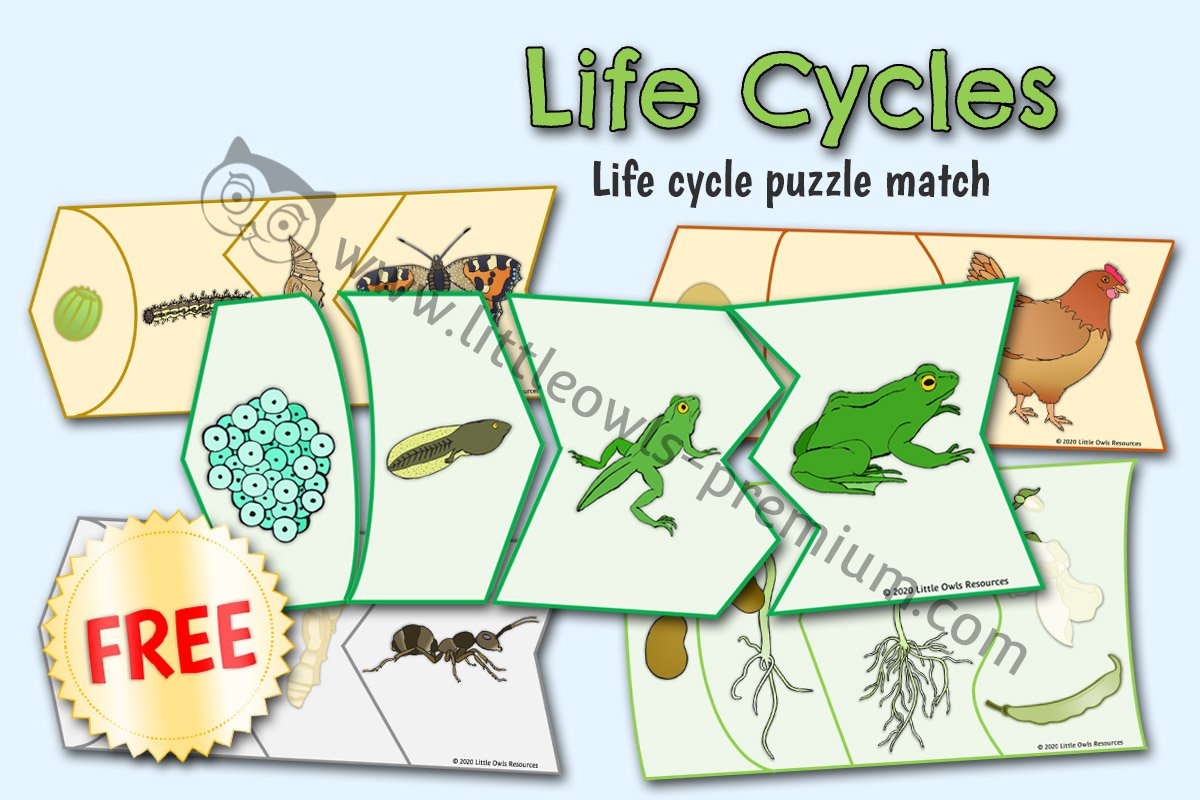






































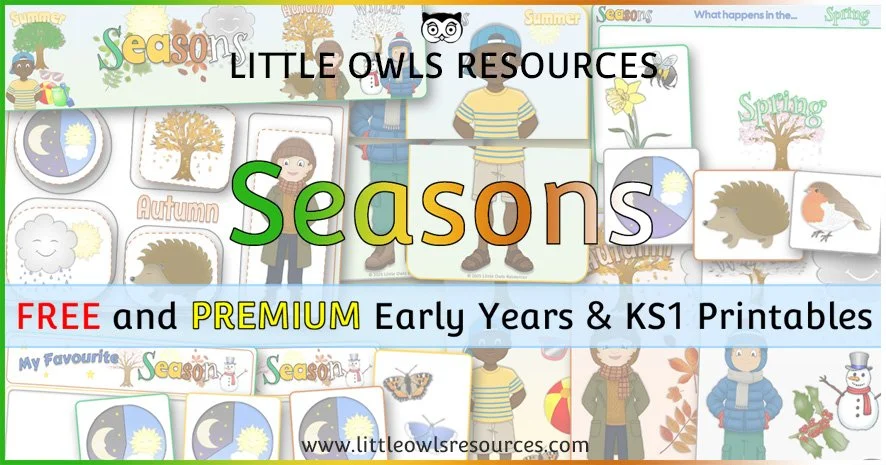









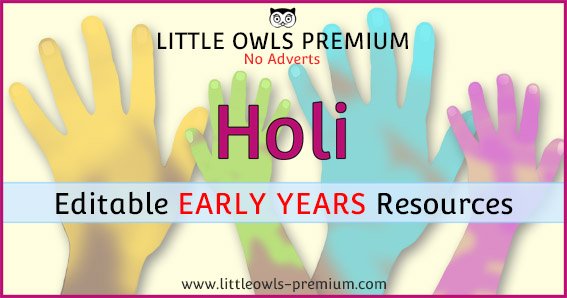
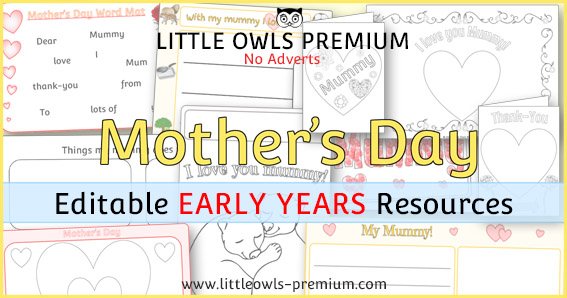

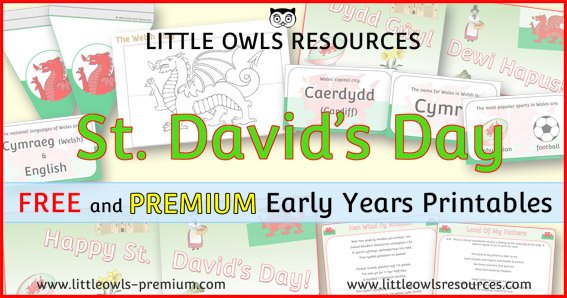
















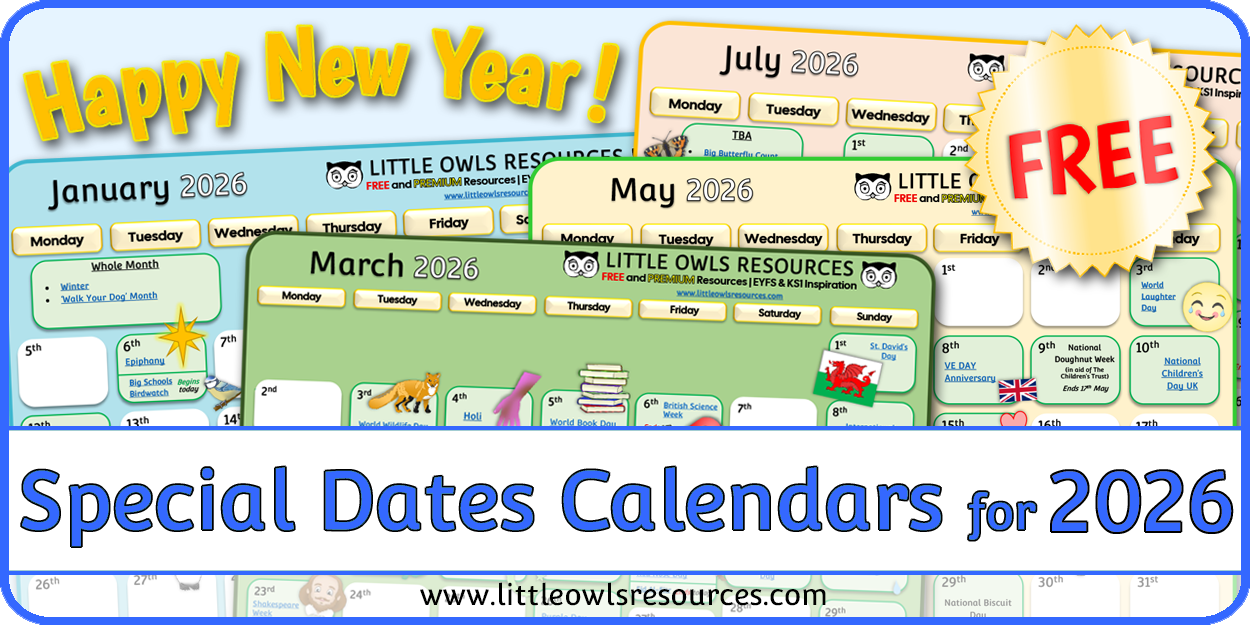
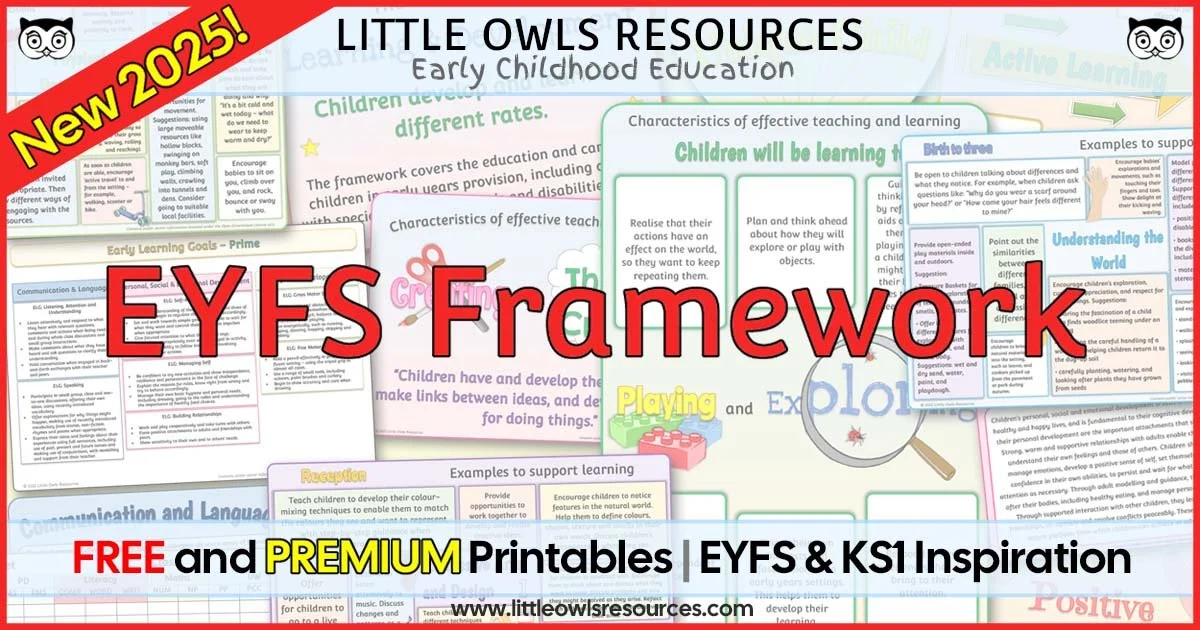

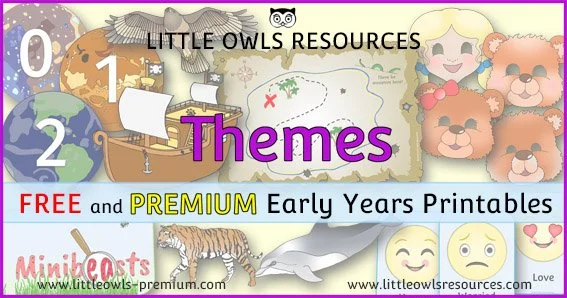

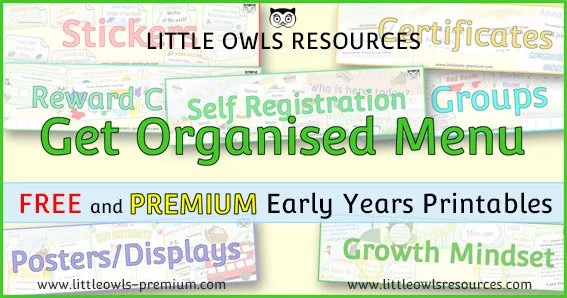

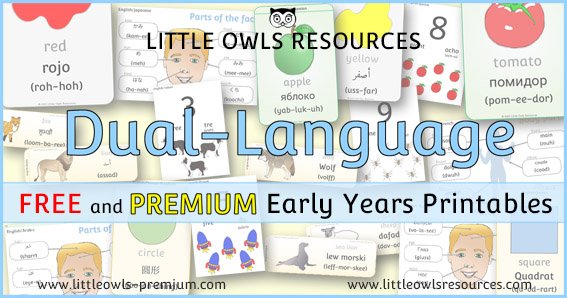
Let's learn about being kind and understanding towards everyone, especially for Purple Day! 💜🎗️ Purple Day is a special international day celebrated every year on March 26th. It was started in…